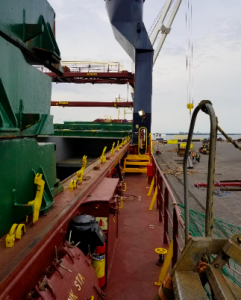Seafarers grossly underpaid, want better wifi
Seafarers grossly underpaid, want better wifi

Seafarer cook Edgar from Pampanga.
July 16, 2023
By Jesson Reyes
Edgar, a cook on the cargo ship Vectis Pride, has just finished his 11-hour shift. He is one of the eight Filipino crew members aboard the vessel. Monday marked the crew’s arrival at the Port of Hamilton, where they have three days to unload heavy Dutch-imported steel beams before recrossing the Atlantic Ocean to Spain. United Kingdom-based Vectis Pride operates as a cargo vessel.
“Marami kaming relatives dito sa Canada” he says stated, “Yes, I also have options,” he said in casual conversation with volunteer ship visitors.
Edgar who hails from Pampanga, Philippines is on his third contract with the same company. He is in the fourth month of a 9-month contract. The Philippines is a major source of maritime workers around the world. At least one Filipino is present for every four or five other crew members, according to surveys. It is estimated by Migrante International that a quarter of a million Filipinos are employed as seafarers.
90% of the global economy is backed by 0.00001% of the world’s population. Despite the obvious importance of seafarers to the global supply chain, many seafarers, particularly those employed by Flags of Convenience, are grossly underpaid; contracts that typically last between 6 and 9 months are frequently violated due to delays with the reliever; and long periods of work are a common occurrence.

Photos provided
Edgar, who studied cooking at a technical college in Pampanga, made sure to prioritize serving dishes that were respectful of local customs. “For us Filipinos, rice is life!” He then emphasised the importance of rice by saying, “No rice, no power.”
Advocates for seafarers in the Philippines, such as the SEAnetwork and Concerned Seafarers of the Philippines, have been advocating for a Magna Carta of Seafarers that will ensure security of tenure for seafarers who have worked for more than a year, the removal of work-related restrictions on accessing financial supports in the event of illness or death, and the inclusion of seafarers onboard fishing vessels. A House bill is currently being debated in Congress.
The Mission to Seafarers Southern Ontario, which operates the Hamilton seaman’s club, has been serving seafarers since 1961. They provide ship visits as well as free rides around Hamilton’s downtown area for a quick stop at local shopping establishments. The Mission also has a physical centre a few hundred metres from the ports where workers can get free Wi-Fi and buy souvenirs. Ship visits are a way for the mission to ensure the well-being of seafarers. Some days, they may offer difficult-to-find international SIM cards, a box of chocolates, and a copy of the local newspaper. There may be days when they liaise between distressed seafarers and representatives of the International Transport Workers Federation (ITF) for violations of the Maritime Labour Convention (MLC).
When asked, what would he like to see change in their conditions as seafarers? Edgar immediately responded, “internet connection could be a lot better for us while we are on board.”
The availability of Internet data may differ from one shipping company to the next. Edgar and his crew members are given 2 GB of data per week, which is insufficient to send messages to loved ones back home. According to the Mission in Southern Ontario, installing Wi-Fi infrastructure in the Port of Hamilton would cost Transport Canada and the port authorities roughly a quarter-million dollars. An undertaking that is not currently a top priority for them.
“Of course, our pay is simply insufficient to support our families and other responsibilities at home.”
Edgar and his colleagues will finish their 9-month contract transporting steel beams across both sides of the Atlantic Ocean. Their contract should end just in time for the holiday season with family and loved ones.
Comments (0)